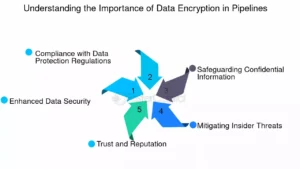Data Pipeline Security & Encryption
When building a data analytics pipeline in AWS, it’s critical to ensure that data is secure at every stage—from collection and storage to processing and visualization. AWS offers built-in security and encryption features across its services to help you protect sensitive data and meet industry regulations.
Why Security Matters in Data Analytics
- Protects PII (Personally Identifiable Information) like user names, emails, transactions
- Ensures compliance with standards like GDPR, HIPAA, ISO, etc.
- Builds trust and prevents data leaks or unauthorized access
- Helps organizations avoid penalties, legal issues, and reputation loss
Key Concepts in Data Pipeline Security
1. Encryption at Rest
This protects data stored in services like S3, RDS, Redshift, and Glue.
How it’s done:
AWS Key Management Service (KMS) manages encryption keys
Use server-side encryption (SSE) for services like:
- S3 (SSE-S3, SSE-KMS, SSE-C)
- RDS and Redshift (AES-256 encryption)
Glue and Athena jobs can read/write encrypted files in S3
Example: Data files stored in S3 from a food delivery app can be automatically encrypted using SSE-KMS.
2. Encryption in Transit
This secures data while it moves between services or over the internet using TLS (Transport Layer Security).
Applies to:
- Data from Kinesis to S3
- Queries from QuickSight to Redshift
- APIs and SDKs interacting with AWS services
Example: When QuickSight accesses Athena via JDBC/ODBC, it uses TLS to keep data secure while querying.
3. Access Control & IAM Policies
AWS uses Identity and Access Management (IAM) to control:
- Who can access which service (e.g., Glue, Redshift)
- What actions they can perform (read, write, delete)
- From where they can access (IP restrictions, MFA)
Best Practices:
- Grant least privilege access
- Use IAM roles for EC2, Lambda, Glue
- Enable logging and monitoring with AWS CloudTrail and CloudWatch
4. Network Security Layers
AWS offers features to protect data pipelines at the infrastructure level:
- VPC (Virtual Private Cloud): Isolates resources from public internet
- Security Groups & NACLs: Control inbound/outbound traffic
- PrivateLink: Secure private connections between services
Example: You can run a Glue job in a VPC subnet with no public access, keeping your processing layer isolated and safe.
Real-World Analytics Example
For an e-commerce company like Adidas:
- Order data is collected using Kinesis (TLS encryption in transit)
- Stored in S3 with SSE-KMS encryption
- Transformed using Glue in a VPC
- Loaded into Redshift with encryption at rest
- Accessed via QuickSight with IAM-based access controls
This end-to-end setup ensures secure analytics for dashboards used by business teams.
Summary Table
| Security Layer | AWS Feature/Service | Example Use Case |
|---|---|---|
| Encryption at Rest | S3 SSE-KMS, Redshift AES-256 | Encrypt stored data files |
| In-Transit Security | TLS, HTTPS | Secure data from Kinesis to S3 |
| Access Control | IAM roles/policies | Limit user access to data |
| Network Security | VPC, Security Groups | Isolate Glue jobs from public access |
